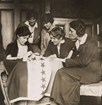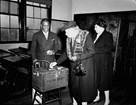Civics education can fit into a variety of social studies classrooms. These lesson plans make use of young people’s aptitude for creating and sharing information digitally. The lessons can be used in conjunction with other Teaching with Historic Places lessons or on their own. This series was created by Talia Brenner and edited by Katie McCarthy, NCPE interns with the Cultural Resources Office of Interpretation and Education. All lesson plans are designed to fit into about an hour.
-
Article 1: (H)our History Lesson: Teaching Engaged Citizenship, Amending the U.S. Constitution

How is the Constitution amended? Should the process of amending the Constitution be easier? What are some amendments that never became law? What might our next amendment be? Read more
-
Article 2: (H)our History Lesson: Teaching Engaged Citizenship, Federalism

What is federalism? How have some Americans used debates about federalism to promote segregation? How is federalism relevant to the COVID-19 pandemic? Read more
-
Article 3: (H)our History Lesson: Teaching Engaged Citizenship, The Judicial System

How does the judicial system work? What is a federal court? Why are people trying to reclassify certain offenses? How is the Supreme Court of your state, district, or territory organized? Read more
-
Article 4: (H)our History Lesson: Teaching Engaged Citizenship, Voting Rights

How is the COVID-19 pandemic affecting voting rights? What are remedies for low voter turnout? Read more
-
Article 5: (H)our History Lesson: Teaching Engaged Citizenship, First Amendment Freedoms

How have people engaged their First Amendment freedoms throughout U.S. history? Read more
